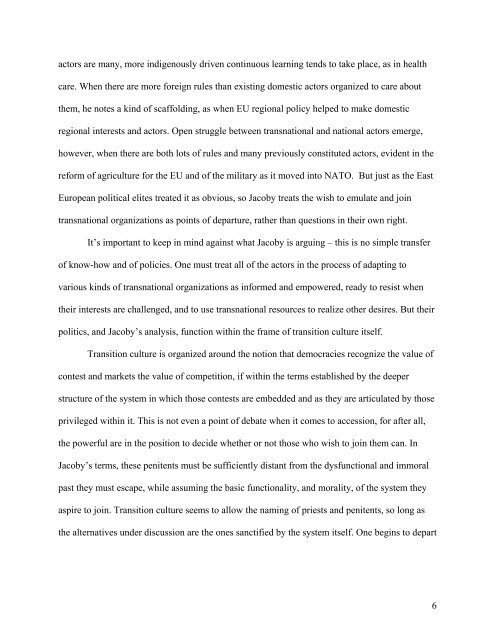from transition to hegemony - The Watson Institute for International ...
from transition to hegemony - The Watson Institute for International ...
from transition to hegemony - The Watson Institute for International ...
You also want an ePaper? Increase the reach of your titles
YUMPU automatically turns print PDFs into web optimized ePapers that Google loves.
ac<strong>to</strong>rs are many, more indigenously driven continuous learning tends <strong>to</strong> take place, as in health<br />
care. When there are more <strong>for</strong>eign rules than existing domestic ac<strong>to</strong>rs organized <strong>to</strong> care about<br />
them, he notes a kind of scaffolding, as when EU regional policy helped <strong>to</strong> make domestic<br />
regional interests and ac<strong>to</strong>rs. Open struggle between transnational and national ac<strong>to</strong>rs emerge,<br />
however, when there are both lots of rules and many previously constituted ac<strong>to</strong>rs, evident in the<br />
re<strong>for</strong>m of agriculture <strong>for</strong> the EU and of the military as it moved in<strong>to</strong> NATO. But just as the East<br />
European political elites treated it as obvious, so Jacoby treats the wish <strong>to</strong> emulate and join<br />
transnational organizations as points of departure, rather than questions in their own right.<br />
It’s important <strong>to</strong> keep in mind against what Jacoby is arguing – this is no simple transfer<br />
of know-how and of policies. One must treat all of the ac<strong>to</strong>rs in the process of adapting <strong>to</strong><br />
various kinds of transnational organizations as in<strong>for</strong>med and empowered, ready <strong>to</strong> resist when<br />
their interests are challenged, and <strong>to</strong> use transnational resources <strong>to</strong> realize other desires. But their<br />
politics, and Jacoby’s analysis, function within the frame of <strong>transition</strong> culture itself.<br />
Transition culture is organized around the notion that democracies recognize the value of<br />
contest and markets the value of competition, if within the terms established by the deeper<br />
structure of the system in which those contests are embedded and as they are articulated by those<br />
privileged within it. This is not even a point of debate when it comes <strong>to</strong> accession, <strong>for</strong> after all,<br />
the powerful are in the position <strong>to</strong> decide whether or not those who wish <strong>to</strong> join them can. In<br />
Jacoby’s terms, these penitents must be sufficiently distant <strong>from</strong> the dysfunctional and immoral<br />
past they must escape, while assuming the basic functionality, and morality, of the system they<br />
aspire <strong>to</strong> join. Transition culture seems <strong>to</strong> allow the naming of priests and penitents, so long as<br />
the alternatives under discussion are the ones sanctified by the system itself. One begins <strong>to</strong> depart<br />
6
















